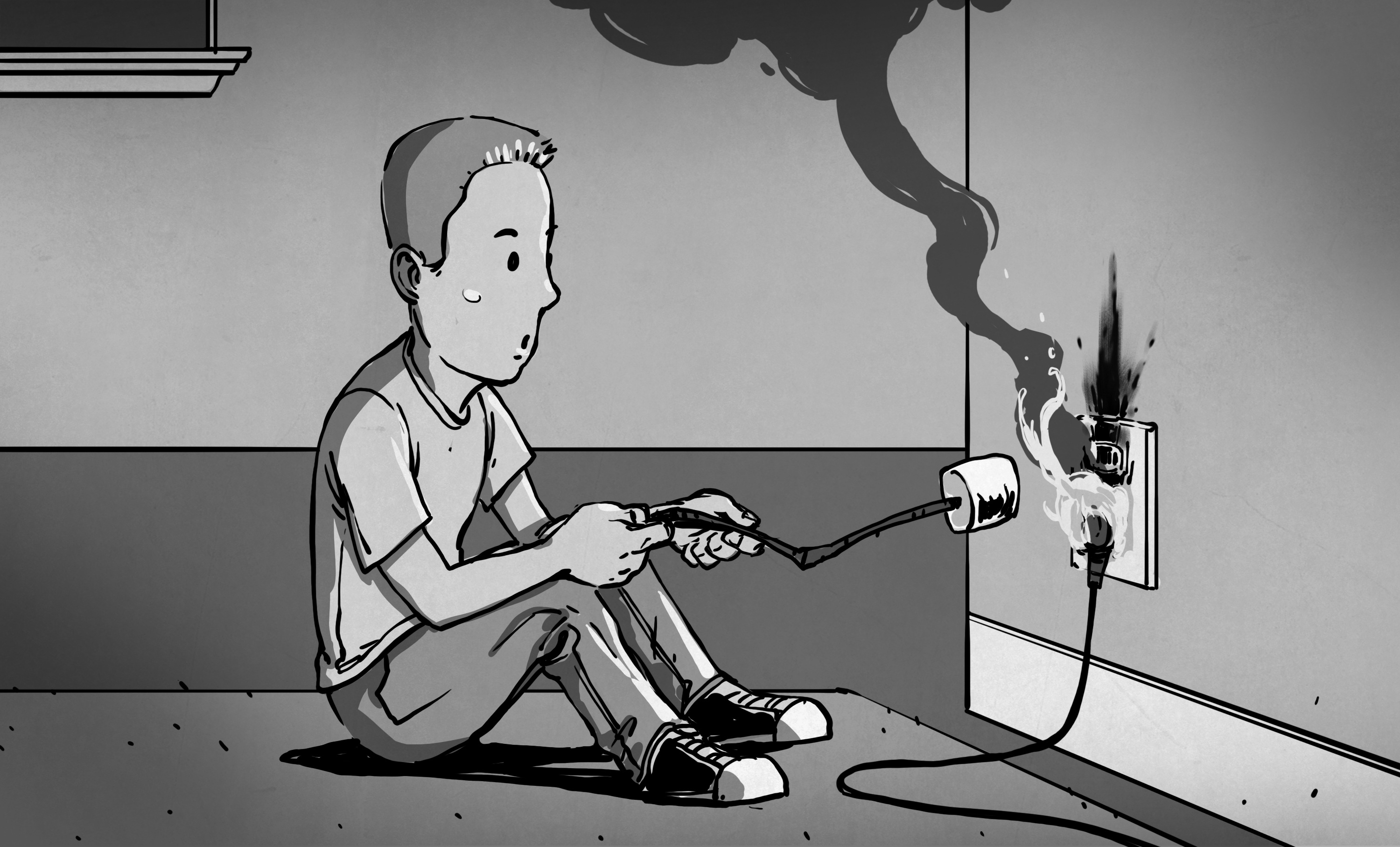"Surge protectors", if you are talking about a standard "surge protector power strip", are essentially worthless, even brand new, unless it is a high quality industrial type surge protection unit. Unless you have a high quality type power strip surge protector, or dedicated surge protector and power conditioner, you are best off to simply plug the power supply directly into the wall. The use of normal type power strips and "surge protectors" do nothing more than serve to give YOU a false sense of security that you are protected from something which in reality, you're not. Often they actually do nothing more than create problems where none might exist had the unit simply been directly plugged into the wall outlet.
True protection is generally, and best, provided for at the breaker panel with a properly earthed whole house breaker, but I would never cry foul against also using a good high end industrial type protection unit either. Even then though, it may not actually stop anything bad from happening if there is, for example, a direct strike in fairly close proximity to your location. As far as being protected just from other appliances that are also on the same circuit, the only way that might be a problem is if the combination of everything on the circuit exceeds what the circuit is rated for and then it would simply trigger the breaker. I can't see it actually CAUSING anything to degrade or fail really.
To be more clear, my usual rant on this subject goes something like this, if you care to read it.
Years of experience using PC systems and having to diagnose bushels full of issues where a high number of them ended up being faults with the circuitry inside the power strips. Primarily, cheap box store models but also a good number of supposedly premium power strip "surge protectors" that don't actually protect you from anything other than your own fear of what might happen if you actually end up needing a surge protector. A false sense of security.
Most people buy and use power strips because they THINK that the fact it says surge protector means something. Usually, it doesn't. This is one of my favorite quotes on the subject from an electrical engineer and residential/commercial electrical journeyman I know.
Buy a good one, but understand expensive OFTEN does not equal good.
"Monster" brand are the low end junk that are sold for a premium price. Look for what us professionals use. Tripp-lite is one of my go to absolute favorites as they have a price to quality mix that is exceptional. The Belkin brand is junk as far as I am concerned as they focus on how it looks and not how it works. APC is also another one that I will trust , but they mostly cater to data centers and Corporate customers when it comes to their quality units and they DO sell some lower end products that slot into the budget market that are not the same unquestionable quality as what they sell for professional and enterprise use.
Lastly, if you really care about your electronics, get a Whole house surge suppressor installed in your electrical panel. Only a few hundred bucks and it protects everything including the overpriced LED lightbulbs that is all the rage these days.
Units you want to consider will be those sold by APC, Tripp-Lite, Leviton, Eaton, General Electric, Polyphaser, Ditek, Siemens, ABB, Square D, Intermatic, Cutler-Hammer (Eaton), and Syscom, these are the brands you can trust to have high quality internal electronics if you MUST use a power strip but even so you STILL will want to ask around about specific models OR look to professional reviews as even these big boys occasionally have a product with some glaring flaw that makes it's way into the final product and might best be avoided compared to other available models.
Do not however use a power strip thinking that it offers significant protection, because even the best of them does not, not really. Whole house protection is the only real protection from surges.
Monster and Belkin, and a few others that are commonly used, almost unilaterally use the same protections in their 45 dollar surge protector strips as what you would find in an 8 dollar Amazon or Walmart branded model. And if you ever take one of these, or any cheap box store, dollar store (Even worse than these others usually BUT occasionally about the same) or Harbor Freight power strip apart you are likely to find frayed wires, poorly soldered connections with blobs of solder nearly touching crucial and potential short circuit points, super low quality MOVs, and a ton of other indicators that no real integrity was involved in the design or manufacturer of these units.
Another factor to keep in mind is that even with some of these high quality units, any protection that MIGHT be afforded, is usually the end of that product after one shot. This, directly from the Tripp-Lite manual for the #1 selling surge protection power strip in the world.
All models feature an internal protection that will disconnect the surge-protective component at the end of its useful life but will maintain power to the load now unprotected.
I believe many models from APC and a couple of the others I listed have now incorporated designs that permanently disengage any ability of the device to deliver power once a surge or short of significant enough caliber to incur the protection has occured. That basically means once there has been a surge or short, throw the device away. Even for high end models. Only whole house protection and properly earthed circuits offer any true protection from a serious surge or direct strike from lightning somewhere close enough to affect your segment of the grid.
And whatever you do, don't EVER buy any kind of extension cord, power strip or other electronic device with slip rings.
A few weeks ago I needed a power strip in my home office. The outlet in question is located behind a filing cabinet so it would need a low profile plug. I jumped on Amazon to buy a surge suppressor…

hackaday.com
Also, do not EVER use an extension cord to power your computer with, especially not one that is longer than about five feet, unless it is a very large gauge contractors type extension cord, usually 10 gauge 15 amp. Anything less and you are asking for the potential to have problems. Increasing the circuit resistance, which is what you do when you extend the length of the circuit, is never desirable IF it can be avoided. In general it is best to simply plug directly into the wall outlet, an industrial power strip that is of high quality OR a high quality UPS unit.


